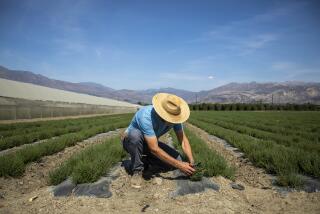Big Firms Gobble Organics as USDA Hashes Out Rules
- Share via
WASHINGTON — Want to know what’s happening with organic foods?
Investors are channeling millions into a natural foods industry that grew out of the rebellious ‘60s. Shoppers’ interest in health and nutrition caused the sale of organic foods to cross the $2-billion barrier in 1994, with yearly sales growth in double-digit percentages.
Now the Agriculture Department, long the fortress of high-volume, mass-production farming, may finally cough up national standards this fall for organic foods.
*
Many of the organic farming pioneers serve on the 15-member National Organic Standards Board, a group of outside advisors to the department. And many hail the growth.
“What I think is great is [that] the availability is becoming much broader, and some of that is because of the large businesses that have been around,” said Margaret Wittenberg, director of inner communications at Austin, Texas-based Whole Foods Market Inc., the largest chain of natural foods supermarkets.
In June, Whole Foods announced a $135-million merger with Fresh Fields, a Rockville, Md., rival.
In February, H.J. Heinz Co. announced the purchase of Earth’s Best Inc., a Boulder, Colo., maker of organic baby food. And an investment group controlled by Roy Disney, Walt’s nephew, recently bought majority interest in Cascadian Farms, in Washington state.
In addition, Health Valley Foods Inc., of Irwindale was acquired in April by Intrepid Food Holdings, formed last year by Chicago’s Frontenac Co., one of the nation’s oldest and largest private investment firms.
The Shansby Group investment firm in San Francisco has acquired controlling interest of Arrowhead Mills Inc. of Hereford, Texas, and DeBoles Nutritional Foods Inc. of Shreveport, La.
Organic generally means the crop is grown or animals raised without artificial fertilizers or pesticides, without growth hormones, and without antibiotics, in a way that enriches rather than depletes the environment.
Yet distinctions become fuzzy, as the standards board has found. Insects produce pheromones, sex “attractants” that can be used to trap bugs, rather than using pesticides. The pheromones must be synthetically made to be practical. The board recommended their approval.
*
The board will have to decide again and again whether products of gene-splicing, such as enzymes used to make cheese, should be allowed. It even considered whether glyphosate, or Roundup, a relatively benign weed-killer, should be allowed. It said no.
Joan D. Gussow, a retired Columbia University nutritionist appointed to the board this year, said the board-recommended standards are technically good. Yet she still worries organic will lose some of its meaning.
More to Read
Inside the business of entertainment
The Wide Shot brings you news, analysis and insights on everything from streaming wars to production — and what it all means for the future.
You may occasionally receive promotional content from the Los Angeles Times.











